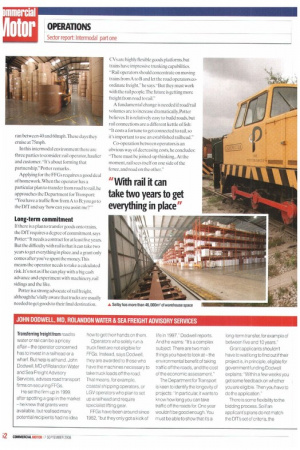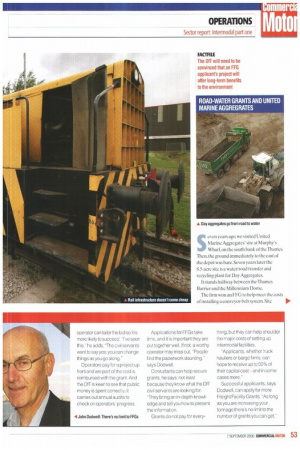JOHN DOD WELL, MD, ROLAN DON WATER & SEA FREIGHT
Page 52

Page 53

If you've noticed an error in this article please click here to report it so we can fix it.
ADVISORY SERVICES Transferring freight from road to water or rail can be a pricey affair —the operator concerned has to invest in a railhead or a wharf. But help is at hand. John Dodwell, MD of Rolandon Water and Sea Freight Advisory Services, advises road transport firms on securing FFGs.
He set the firm up in 1999, after spotting a gap in the market — he knew that grants were available, but realised many potential recipients had no idea
how to get their hands on them.
Operators who solely run a truck fleet are not eligible for FFGs. Instead, says Dodwell, they are awarded to those who have the machines necessary to take truck loads off the road. That means, for example, coastal shipping operators, or LGV operators who plan to set up a railhead and require specialist lifting gear.
FFGs have been around since 1982, "but they only got a kick of life in 1997," Dodwell reports. And he warns: "It's a complex subject. There are two main things you have to look at —the environmental benefit of taking traffic off the roads, and the cost of the economic assessment."
The Department for Transport is keen to identify the longevity of projects: In particular, it wants to know how long you can take traffic off the roads for. One year wouldn't be good enough. You must be able to show that it's a
long-term transfer, for example of between five and 10 years."
Grant applicants shouldn't have to wait long to find out if their project is, in principle, eligible for government funding Dodwell explains: "Within a few weeks you get some feedback on whether you are eligible. Then you have to do the application."
There is some flexibility to the bidding process. So if an applicant's plans do not match the DT's set of criteria, the operator can tailor the bid so it is more likely to succeed. "I've seen this," he adds. "The civil servants want to say yes; you can change things as you go along."
Operators pay for a project up front and are part of the cost is reimbursed with the grant. And the DfT is keen to see that public money is spent correctly; it carries out annual audits to check on operators' progress. Applications for FFGs take time, and it is important they are put together well. If not, a worthy operator may miss out. "People find the paperwork daunting," says Dodwell.
Consultants can help secure grants, he says; not least because they know what the DfT civil servants are looking for: "They bring an in-depth knowledge and tell you how to present the information.
Grants do not pay for every
thing, but they can help shoulder the major costs of setting up intermodal facilities.
"Applicants, whether truck hauliers or barge firms, can hope to receive up to 50% of their capital cost— and in some cases more."
Successful applicants, says Dodwell, can apply for more Freight Facility Grants: "As long as you are increasing your tonnage there's no limit to the number of grants you can get."
































































































































































































